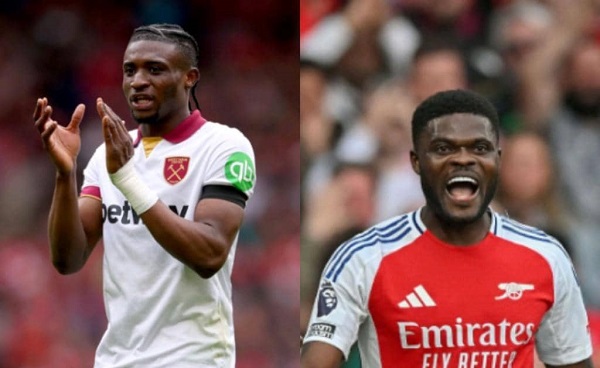Ghanaian midfielders Thomas Partey and Mohammed Kudus are at a career crossroads in London, as agents brace for tough negotiations that could reshape both players' futures — and their clubs’ financial strategies and balance sheets — ahead of a fiercely active summer transfer window.
For Partey, the tide has turned dramatically at Arsenal. Once seemingly destined for the exit door, the 31-year-old has staged a timely resurgence, proving pivotal to Arsenal’s ambitious push for UEFA Champions League glory.
His revival has prompted manager Mikel Arteta and the club’s hierarchy to rethink their stance, with talks now underway to extend his stay beyond next summer.
Contract talks
Partey's current five-year contract expires on June 30, 2025, and Arsenal are keen to avoid the financial and sporting risk of losing the experienced midfielder for nothing next summer.
After months where an exit appeared inevitable, his return to prominence has forced a rethink at the Emirates.
Arteta himself was unequivocal following Partey's commanding display against in their Champions League victory over Real Madrid: "Without a question of a doubt, Thomas Partey is a super important player for us, and I want him to stay."
Arsenal have now opened contract talks with Partey’s representatives, according to Sky Sports and The Athletic, exploring either a two-year extension or a one-year deal with an option for a further 12 months. However, there is a catch — the Gunners expect the Ghanaian to accept a significant salary reduction.
Currently earning an estimated £200,000 a week (£10.4 million annually) — among Arsenal’s top earners — Partey faces the classic business dilemma: security versus earnings.
At 31 and with a history of injuries, Arsenal’s cautious approach is understandable. Financially, retaining the Ghanaian star on a lower wage makes perfect sense for the Gunners, sparing them the hefty outlay required to replace him in a tough market for defensive midfielders.
The negotiations carry notable business lessons. Arsenal’s strategy reflects prudent risk management: retaining an experienced performer without committing to unsustainable wages. At the same time, it allows for continuity and avoids a costly foray into an inflated market for defensive midfielders.
Partey’s value to Arsenal this season is undeniable. Featuring more than in any previous campaign since his 2020 move from Atlético Madrid, he has been indispensable, even slotting in at right-back when injury crises struck.
His versatility and experience offer Arsenal continuity — a priceless commodity as they navigate Europe’s elite competition and the financial pressures that come with squad building at the top level.
If a deal cannot be struck, Partey — valued by Barcelona among others — could leave on a Bosman transfer, offering him the luxury of choice for his final major contract.
Corporate executives watching these talks can draw parallels to succession planning: organisations must assess the cost-benefit of retaining experienced hands versus investing in fresh talent.
Kudus' Saudi interest
Across London, at West Ham United, another Ghanaian star faces a career-defining decision.
Mohammed Kudus, the Hammers’ £38 million signing from Dutch giants Ajax in 2023, is attracting heavyweight interest, particularly from Saudi Arabian powerhouse Al Nassr.
Sports media channel TalkSPORT reports that Al Nassr are preparing an astonishing £85.3 million ($113.5m) bid for the 24-year-old, who has dazzled the Premier League with his versatility and flair.
The prospect of teaming up with global icons Cristiano Ronaldo and Sadio Mane reflects his soaring stock value. It could not only elevate Kudus’ profile but also dramatically boost his earnings, currently estimated at £90,000 a week.
Al Nassr’s interest is long-standing; they attempted a move in January. Now, with the Saudi Pro League aggressively targeting young elite talent, Kudus is seen as a marquee acquisition to bolster their already star-studded front line. Financially, a move to Saudi Arabia would be life-changing for Kudus given Al Nassr’s generous salary structures.
Yet, the financial riches of Saudi Arabia must be weighed against footballing ambitions.
Liverpool are also said to be keen, with newly crowned English Premier League champions keen to add the young Ghanaian’s dynamism to Arne Slot’s evolving squad.
Crucially, Kudus' contract includes an £80 million buyout clause for Premier League clubs, effective from 1 July, but West Ham might entertain lower offers, with Football Insider suggesting £70 million could be enough to secure his services.
For West Ham, the financial logic is clear: cashing in on Kudus could fund critical reinforcements under new manager Graham Potter.
Former club scout Mick Brown remarked that selling Kudus might be the most pragmatic path to strengthening the squad.
It underscores a broader business truth — sometimes, parting with a star asset at peak value can underpin future growth.
The Kudus situation also highlights the evolving dynamics of global sports business.
The Saudi Pro League’s aggressive pursuit of European talent represents a shift in football’s traditional power centres.
For clubs and players alike, navigating this new financial landscape demands strategic foresight: balancing immediate monetary rewards with long-term career value.
However at Arsenal, Partey’s situation offers a different kind of business consideration.
Retaining an injury-prone yet proven performer at a reduced wage might represent sound value — a classic corporate tactic of renegotiating contracts to reflect updated risk profiles, rather than replacing high-cost legacy employees wholesale.
Both Partey’s and Kudus’ situations offer pertinent business lessons for corporate executives navigating negotiations.
Timing is everything. Partey’s rejuvenation has shifted his bargaining position dramatically.
Arsenal’s challenge is securing value without overcommitting to a player entering the twilight of his career.
Similarly, West Ham face a classic 'sell-high' dilemma: with Kudus’ market value at its peak and demand surging, the club must weigh the lure of an immediate financial windfall against the long-term value of retaining a proven performer.
